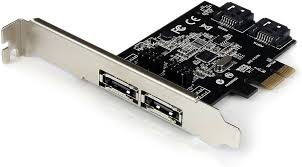Here are some details about a PCI Express eSATA card:
- **Functionality:** A PCI Express eSATA card is an expansion card that adds external Serial ATA (eSATA) ports to a computer system, typically for connecting external storage devices such as hard drives or SSDs.
- **Interface:** It connects to the computer's PCIe slot, providing high-speed data transfer rates for eSATA devices.
- **eSATA Ports:** The card typically features multiple eSATA ports, allowing users to connect multiple external storage devices simultaneously.
- **Compatibility:** Compatible with various operating systems including Windows, macOS, and Linux. It works with desktop computers and servers that have an available PCIe slot.
- **RAID Support:** Some models may support RAID configurations for enhanced data protection or performance.
- **Hot-Swapping:** Depending on the card and operating system support, it may allow for hot-swapping of eSATA devices, enabling users to connect or disconnect external drives without shutting down the system.
- **Plug-and-Play:** Typically features plug-and-play functionality, requiring minimal setup. Users may need to install drivers provided by the manufacturer for full functionality.
- **Usage:** Ideal for users who require additional external storage connectivity for backup, data transfer, or expansion purposes, especially when the onboard SATA ports are insufficient or unavailable.
- **Speed:** Offers high-speed data transfer rates, making it suitable for tasks such as multimedia editing, file backups, and data archiving.
Overall, a PCI Express eSATA card provides a convenient and flexible solution for adding external storage connectivity to a computer system, enhancing its versatility and expandability.
